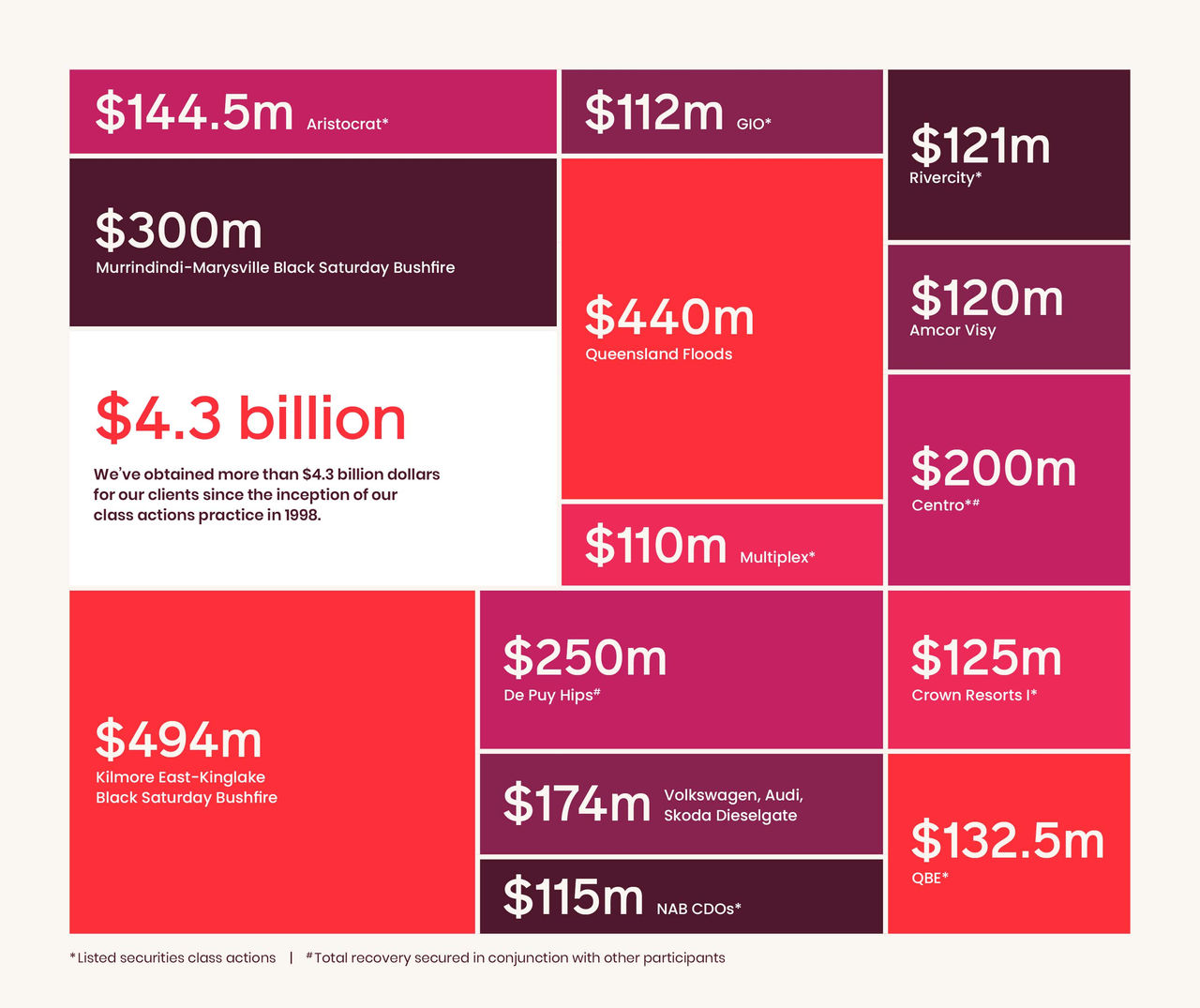Class Actions
Sometimes a wrongdoing can affect more than one person. If this happens, our legal team can make a group claim on behalf of everyone affected. This is known as a class action.
Class actions allow individual claims to be brought together in a single action against a defendant. Joining a class action can speed up the legal process and reduce hassle and cost.
A class action can bring to account a wrongdoer who causes widespread harm. If the case is successful, the Court can fairly divide the compensation amount between the group.
A class action can bring to account a wrongdoer who causes widespread harm. If the case is successful, the Court can fairly divide the compensation amount between the group.
Legislation varies between Australian states and territories so it’s important that you’re represented by a law firm with knowledge and experience in this area.
Shine Lawyers provide legal services on a No Win No Fee* basis and can help you find out if you have a claim for compensation.
*Conditions apply
How do I start a class action?
Class actions take place in the Federal Court and State Supreme Courts of Australia.
- There must be 7 or more people claiming;
- From the same, or similar, event/circumstances; and
- The claim must relate to at least one common issue of law or fact.
Class actions in Australia work on an opt-out model. This means that all potential claimants become members of the action whether they intended to participate or not. These members are bound by the judgment of the court or settlement unless they opt-out. If you are involved in a class action you will be notified.
Who is the Class Actions Team?
Shine Lawyers' Class Action team includes some of the firm’s most experienced special counsel, solicitors and support staff, including law clerks and paralegals.
Investigations and Class Actions
Current Investigations and Class Actions
AMP Insurance Class Action
Bankwest/Commonwealth Bank Class Action
Blue Sky Class Action Investigation
BSA Limited Class Action
BT Super Insurance Class Action Investigation
Car Dealer Flex Commission Class Action
CBA CommInsure Class Action
Colonial First State Super Insurance Class Action
Cumberland Manor Coronavirus Class Action Investigation
Dixon Advisory Class Action Investigation
Essure Class Action Investigation – Birth Control Complications
Iluka Class Action
IOOF Class Action
ISG Management Class Action
McDonalds Breaks Class Action Investigation
PFAS Contamination Class Actions
Bullsbrook Contamination Class Action
Darwin Contamination Class Action
Edinburgh Contamination Class Action
Katherine Contamination Class Action
Lavarack Barracks Contamination Class Action Investigation
Oakey Contamination Class Action
Richmond Contamination Class Action
Townsville Contamination Class Action
Wagga Wagga Contamination Class Action
Wodonga Contamination Class Action
Jervis Bay PFAS Contamination Class Action
Prolapse Mesh Class Action
AMS Mesh Class Action
Johnson & Johnson/Ethicon Mesh Class Action
Boston Scientific Mesh Class Action
Redland Ratepayer Class Action
Ruby Princess Coronavirus Class Action
Northern Territory Stolen Generations Class Action Investigation
Stolen Wages Class Action Investigation
Sun Princess Norovirus Class Action Investigation
Westpac Life Insurance Class Action
WorleyParsons Class Action
Successful Class Actions
Arundel Suntown Tip Class Action
DePuy/Johnson & Johnson Hip Replacement
Quakers Hill Nursing Home Class Action
Royal Bank of Scotland (RBS) Class Action
Wickham Securities Sandhurst
Further Information
For further on information, see the following:
Shine Lawyers provide legal services on a No Win No Fee* basis and can help you find out if you have a claim for compensation.
*Conditions apply
How do I start a class action?
Class actions take place in the Federal Court and State Supreme Courts of Australia.
There are three criteria that need to be fulfilled for the lawsuit to take place:
- There must be 7 or more people claiming;
- From the same, or similar, event/circumstances; and
- The claim must relate to at least one common issue of law or fact.
Class actions in Australia work on an opt-out model. This means that all potential claimants become members of the action whether they intended to participate or not. These members are bound by the judgment of the court or settlement unless they opt-out. If you are involved in a class action you will be notified.
Who is the Class Actions Team?
Shine Lawyers' Class Action team includes some of the firm’s most experienced special counsel, solicitors and support staff, including law clerks and paralegals.
Investigations and Class Actions
Current Investigations and Class Actions
AMP Insurance Class Action
Bankwest/Commonwealth Bank Class Action
Blue Sky Class Action Investigation
BSA Limited Class Action
BT Super Insurance Class Action Investigation
Car Dealer Flex Commission Class Action
CBA CommInsure Class Action
Colonial First State Super Insurance Class Action
Cumberland Manor Coronavirus Class Action Investigation
Dixon Advisory Class Action Investigation
Essure Class Action Investigation – Birth Control Complications
Iluka Class Action
IOOF Class Action
ISG Management Class Action
McDonalds Breaks Class Action Investigation
PFAS Contamination Class Actions
Bullsbrook Contamination Class Action
Darwin Contamination Class Action
Edinburgh Contamination Class Action
Katherine Contamination Class Action
Lavarack Barracks Contamination Class Action Investigation
Oakey Contamination Class Action
Richmond Contamination Class Action
Townsville Contamination Class Action
Wagga Wagga Contamination Class Action
Wodonga Contamination Class Action
Jervis Bay PFAS Contamination Class Action
Prolapse Mesh Class Action
AMS Mesh Class Action
Johnson & Johnson/Ethicon Mesh Class Action
Boston Scientific Mesh Class Action
Redland Ratepayer Class Action
Ruby Princess Coronavirus Class Action
Northern Territory Stolen Generations Class Action Investigation
Stolen Wages Class Action Investigation
Sun Princess Norovirus Class Action Investigation
Westpac Life Insurance Class Action
WorleyParsons Class Action
Successful Class Actions
Arundel Suntown Tip Class Action
DePuy/Johnson & Johnson Hip Replacement
Quakers Hill Nursing Home Class Action
Royal Bank of Scotland (RBS) Class Action
Wickham Securities Sandhurst
Further Information
For further on information, see the following:
Shine Lawyers' website: Click here






























